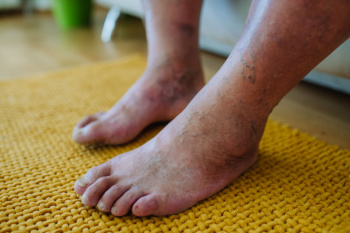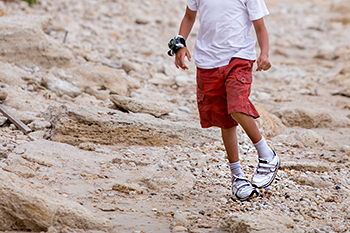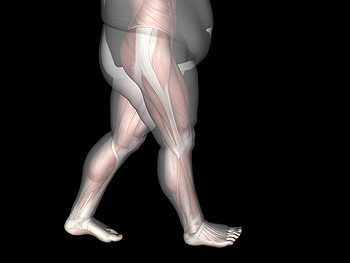Items filtered by date: August 2024
Common Types of Foot Surgery

Foot surgery can address various conditions to relieve pain and improve function. Bunion surgery is performed to correct the deformity of the big toe joint, often involving realignment of the bones. Fusion surgery, typically for severe arthritis, involves joining two or more bones in the foot to reduce pain and stabilize the joint. Hammertoe surgery corrects the abnormal bending of the toes, which can cause discomfort and difficulty walking. Heel surgery addresses issues such as chronic pain or deformities, often involving procedures to repair or realign the heel bone. Additionally, neuroma surgery is used to remove or reduce the swelling of a nerve, usually between the toes, to alleviate pain and discomfort. Each type of surgery aims to address specific foot problems and improve overall mobility and quality of life. If you have a foot condition that may require surgery for relief, it is suggested that you consult a podiatrist who can determine if this is a right choice for you.
Foot surgery is sometimes necessary to treat a foot ailment. To learn more, contact Deborah Rosenfeld of Rosenfeld Podiatry. Our doctor will assist you with all of your foot and ankle needs.
When Is Surgery Necessary?
Foot and ankle surgery is generally reserved for cases in which less invasive, conservative procedures have failed to alleviate the problem. Some of the cases in which surgery may be necessary include:
- Removing foot deformities like bunions and bone spurs
- Severe arthritis that has caused bone issues
- Cosmetic reconstruction
What Types of Surgery Are There?
The type of surgery you receive will depend on the nature of the problem you have. Some of the possible surgeries include:
- Bunionectomy for painful bunions
- Surgical fusion for realignment of bones
- Neuropathy decompression surgery to treat nerve damage
Benefits of Surgery
Although surgery is usually a last resort, it can provide more complete pain relief compared to non-surgical methods and may allow you to finally resume full activity.
Surgical techniques have also become increasingly sophisticated. Techniques like endoscopic surgery allow for smaller incisions and faster recovery times.
If you have any questions please feel free to contact our office located in Marlton, NJ . We offer the newest diagnostic and treatment technologies for all your foot and ankle needs.
How Diabetes Can Affect Feet

Diabetes can significantly impact foot health due to reduced blood circulation and nerve damage, which is known as neuropathy. Poor circulation hampers the delivery of oxygen and nutrients, slowing wound healing and increasing infection risk. Neuropathy diminishes sensation, making it difficult to detect injuries or pressure points, leading to untreated wounds. Proper foot care is essential for individuals with diabetes. Daily inspections for cuts, blisters, or swelling, keeping feet clean and moisturized, and wearing properly fitting shoes are key steps. If you have diabetes, it is suggested that you schedule regular visits to a podiatrist who can monitor foot health, treat issues early, and provide guidance on preventive care.
Diabetic foot care is important in preventing foot ailments such as ulcers. If you are suffering from diabetes or have any other concerns about your feet, contact Deborah Rosenfeld from Rosenfeld Podiatry. Our doctor can provide the care you need to keep you pain-free and on your feet.
Diabetic Foot Care
Diabetes affects millions of people every year. The condition can damage blood vessels in many parts of the body, especially the feet. Because of this, taking care of your feet is essential if you have diabetes, and having a podiatrist help monitor your foot health is highly recommended.
The Importance of Caring for Your Feet
- Routinely inspect your feet for bruises or sores.
- Wear socks that fit your feet comfortably.
- Wear comfortable shoes that provide adequate support.
Patients with diabetes should have their doctor monitor their blood levels, as blood sugar levels play such a huge role in diabetic care. Monitoring these levels on a regular basis is highly advised.
It is always best to inform your healthcare professional of any concerns you may have regarding your feet, especially for diabetic patients. Early treatment and routine foot examinations are keys to maintaining proper health, especially because severe complications can arise if proper treatment is not applied.
If you have any questions please feel free to contact our office located in Marlton, NJ . We offer the newest diagnostic and treatment technologies for all your foot and ankle needs.
Clubfoot and the Ponseti Method for Treatment

Clubfoot is a congenital foot condition where one or both feet are abnormally rotated inward and downward. This condition, present at birth, can restrict a child's ability to walk and may lead to mobility issues if left untreated. The Ponseti method is a widely recognized treatment approach for clubfoot, focusing on gentle manipulation and casting to correct the foot's position. This method involves a series of weekly castings to gradually realign the foot, followed by the use of a brace to maintain the corrected position and prevent recurrence. The Ponseti method, a non-surgical approach, has a high success rate and offers a significant improvement in foot function and appearance. If your child has been born with clubfoot, it is strongly suggested that you include a podiatrist on your healthcare team for optimal correction results.
Congenital foot problems require immediate attention to avoid future complications. If you have any concerns, contact Deborah Rosenfeld of Rosenfeld Podiatry. Our doctor can provide the care you need to keep you pain-free and on your feet.
Congenital foot problems are deformities affecting the feet, toes, and/or ankles that children are born with. Some of these conditions have a genetic cause while others just happen. Some specific foot ailments that children may be born with include clubfeet, polydactyly/macrodactyly, and cleft foot. There are several other foot anomalies that can occur congenitally. What all of these conditions have in common is that a child may experience difficulty walking or performing everyday activities, as well as trouble finding footwear that fits their foot deformity. Some of these conditions are more serious than others. Consulting with a podiatrist as early as possible will help in properly diagnosing a child’s foot condition while getting the necessary treatment underway.
What are Causes of Congenital Foot Problem?
A congenital foot problem is one that happens to a child at birth. These conditions can be caused by a genetic predisposition, developmental or positional abnormalities during gestation, or with no known cause.
What are Symptoms of Congenital Foot Problems?
Symptoms vary by the congenital condition. Symptoms may consist of the following:
- Clubfoot, where tendons are shortened, bones are shaped differently, and the Achilles tendon is tight, causing the foot to point in and down. It is also possible for the soles of the feet to face each other.
- Polydactyly, which usually consists of a nubbin or small lump of tissue without a bone, a toe that is partially formed but has no joints, or an extra toe.
- Vertical talus, where the talus bone forms in the wrong position causing other bones in the foot to line up improperly, the front of the foot to point up, and the bottom of the foot to stiffen, with no arch, and to curve out.
- Tarsal coalition, when there is an abnormal connection of two or more bones in the foot leading to severe, rigid flatfoot.
- Cleft foot, where there are missing toes, a V-shaped cleft, and other anatomical differences.
- Macrodactyly, when the toes are abnormally large due to overgrowth of the underlying bone or soft tissue.
Treatment and Prevention
While there is nothing one can do to prevent congenital foot problems, raising awareness and receiving neonatal screenings are important. Early detection by taking your child to a podiatrist leads to the best outcome possible.
If you have any questions please feel free to contact our office located in Marlton, NJ . We offer the newest diagnostic tools and technology to treat your foot and ankle needs.
Obesity and Foot Pain
 Obesity significantly impacts foot health, often leading to chronic foot pain due to the excessive weight exerting pressure on the feet. This added strain can result in conditions like plantar fasciitis, where the thick band of tissue running across the bottom of the foot becomes inflamed, causing intense heel pain. Additionally, the excess weight can contribute to flat feet, where the arches collapse, leading to further discomfort and instability. To manage foot pain associated with obesity, weight reduction through a balanced diet and regular exercise is important. Low-impact activities like swimming or cycling can help shed pounds without placing additional stress on the feet. Supportive footwear that provides adequate arch support and cushioning is also essential. If you carry excess weight and have persistent foot pain, it is suggested that you seek advice from a podiatrist. This medical professional can offer custom orthotics, recommend specific exercises to strengthen foot muscles, and provide guidance on managing foot health, ultimately enhancing mobility and quality of life.
Obesity significantly impacts foot health, often leading to chronic foot pain due to the excessive weight exerting pressure on the feet. This added strain can result in conditions like plantar fasciitis, where the thick band of tissue running across the bottom of the foot becomes inflamed, causing intense heel pain. Additionally, the excess weight can contribute to flat feet, where the arches collapse, leading to further discomfort and instability. To manage foot pain associated with obesity, weight reduction through a balanced diet and regular exercise is important. Low-impact activities like swimming or cycling can help shed pounds without placing additional stress on the feet. Supportive footwear that provides adequate arch support and cushioning is also essential. If you carry excess weight and have persistent foot pain, it is suggested that you seek advice from a podiatrist. This medical professional can offer custom orthotics, recommend specific exercises to strengthen foot muscles, and provide guidance on managing foot health, ultimately enhancing mobility and quality of life.
The more you weigh, the harder your feet must work to support your body. If you’re an obese individual and are concerned about your feet, contact Deborah Rosenfeld from Rosenfeld Podiatry. Our doctor can provide the care you need to keep you pain-free and on your feet.
Obesity and Your Feet
People who are overweight are putting more pressure on their ankles, knees, and hips as well as their feet. This unfortunately can lead to variety of different issues.
Problems & Complications Stemming from Obesity
- When the body is overweight, it tries to compensate by changing the way that it moves. An obese person may lean forward and put extra weight on the wrong part of the foot. This puts unnecessary stress on the feet.
- Obese people are also more likely to develop type II diabetes which is a condition that causes a lot of foot problems. People with diabetes often don’t feel the cuts and sores that they may have on their feet, which can lead to more complicated and severe issues.
- Plantar fasciitis is another foot condition that can be caused by obesity. Plantar fasciitis is an inflammation of the tissue along the bottom of the foot, which causes pain and stiffness while walking and climbing stairs.
If you have any questions, please feel free to contact our office located in Marlton, NJ . We offer the newest diagnostic and treatment technologies for all your foot care needs.


